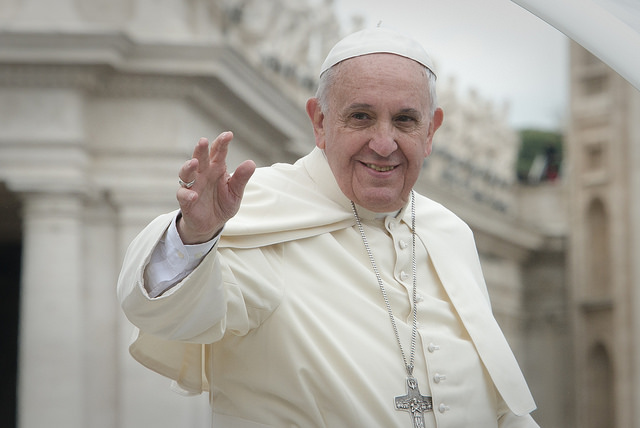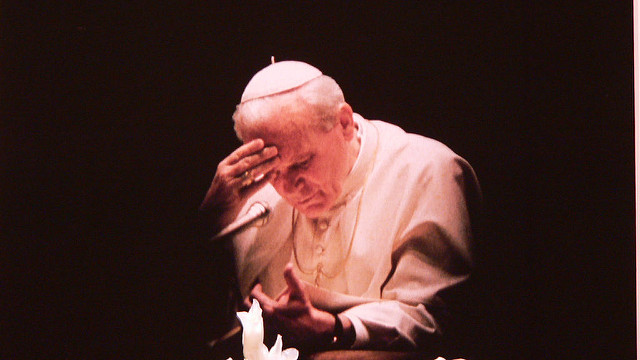Before Chinese New Year Pope Francis gave an interview to a long-time China hand and Asia Times columnist Francesco Sisci. The Pope spoke admiringly about China’s rise, the Catholic Church’s responsibility to respect all civilizations and told the world not to fear China’s rise. China, the pontiff said, is “a great country […] a great culture, with an inexhaustible wisdom”. Francis mentioned his fellow Jesuit, Matteo Ricci, who came to China on an apostolic mission of converting the Chinese elite in the late 16th and early 17th centuries, as an example of dialogue with the Chinese.
There was a lot of praise for Chinese culture, and finally, with a faint echo of Ricci’s attempts at top-down conversion, a greeting directed first at Xi Jinping and only then the Chinese people: “my best wishes and greetings to President Xi Jinping and to all the Chinese people. And I wish to express my hope that they never lose their historical awareness of being a great people, with a great history of wisdom, and that they have much to offer to the world. The world looks to this great wisdom of yours.”

There is much to admire in the words of the pope, who is known for his humility and his appeal to an ecumenical brotherhood of man. He is also usually more outspoken than he was in his interview with Asia Times. His critiques of unbridled capitalism are often seen as support for socialism, although I doubt that he would be a supporter of statist, political socialism. Still, Evo Morales, the socialist strongman of Bolivia, gave the pontiff a crucifix in the shape of a hammer and sickle, and I do not know where in the Vatican that little gift has found a new home.
Shaped as this pope is by Peronism, that Argentinian blend of machismo autarky with a corporatist state, he is neither a socialist, nor a capitalist. He embodies more than his immediate predecessors the ideal of Leo XIII’s Rerum Novarum, in which the Church distances itself from both capitalism and socialism. Leo XIII’s policies were the ‘Third Way’ before it was embraced by ideologically bankrupted social democrats after the implosion of political socialism in Eastern Europe – a process in which the Roman Catholic Church under the courageous leadership of Pope St John Paul II played a pivotal and often unrecognized part.
The period of neoliberal economic policies that followed in the west and elsewhere have created another extreme that is, if not politically, most definitely morally bankrupt. Pope Francis is to be applauded for his criticism of capitalist excess.
During the Cold War Pope St John Paul II was often disingenuously embraced by conservatives for his anti-communist stance. The conservatives who claimed the now sanctified Pope as one of their own only took to heart his evangelical belief that communism was evil, but ignored the other aspects of Church teachings that implored pacifism, charity and mercy.
Similarly, Pope Francis has now become the cuddly catholic for progressives who have latched on to the Pontiff’s criticism of capitalism as support for statist interventionism, while the Church teaches that charity, not the state is to provide a way out of poverty. Indeed, the Pope’s criticism of capitalism makes an unapologetic socialist friend of mine positively giddy, despite his agnosticism.
Where he shrugs off any criticism of socialism as “not my kind of socialism”, he embraces all criticism of capitalism, even if comes from the Church, of which one of his heroes, Antonio Gramsci, said it “must first be infiltrated in order to bring Socialism closer, and then crushed by […] Socialism, the religion that must overwhelm Catholicism”.

The tone of the New Year’s greeting and the interview is nothing new, despite the media attention it attracted. Appeasement of Beijing hardly began under Pope Francis. It has been part of the Vatican’s diplomatic policy in ebbs and flows for decades.
In 1966 Pope Paul VI sent a New Year’s greeting to Chairman Mao without mentioning the cruelties of the Cultural Revolution. With such a glaring omission in the past it would be hard to fault a present-day bridge-building Pope for not mentioning the current oppression.
Nevertheless, this message damages the reputation of a very popular Pope in two ways. First of all, it makes his criticism of capitalism seem one-sided. Why criticize an economic model which has alleviated poverty and enabled charity on an unprecedented scale and not the mercantilism in China, where economic inequality is now bigger than in that madhouse of unbridled capitalism, the United States of America?
Secondly, by only praising China and its ancient wisdom, Pope Francis ignores the real and genuine suffering of Christians in the Workers’ Paradise. While he has eloquently spoken of the suffering of Christians in the Middle East, his silence on the topic when discussing China is another example of this pontiff’s biased view of the world. The fact that he refused a private audience with the Dalai Lama in December 2015 does not bode well for the Church’s efforts to engage China critically.
This emollient approach does not seem to bear fruit. The Vatican has been wooing Beijing for a while now and the official responses are always terse and lukewarm at best. The Vatican has nothing to offer Beijing except a higher degree of legitimacy and it still maintains diplomatic ties with Taiwan, a thorn in Beijing’s side. Chinese Catholics are less than 1% of the population, strictly controlled through the China Patriotic Catholic Association (CPCA), which accepts no sovereignty of Rome in appointing bishops, and unlike Tibetan Buddhists and Uyghur Moslems, the Catholics are a marginal and peaceful bunch. If they are restless, the horrific response of the Party is swift. Bishops who refuse the supremacy of the CPCA are imprisoned, members of house churches faithful to Rome are persecuted, and services are monitored.
There is some justification in the fear that if the Vatican does speak out against the persecution of Catholics, their plight will only get worse. The lack of speaking out makes the Pope’s criticism of western governments loose its edge, though, and he seems to have pinned his hopes on becoming the first Pope to visit China.
However, if there is any illusion at the Vatican of the true intentions of Beijing, there is a poignant truth in Matthew 7:16 : ‘Ye shall know them by their fruits’ and the fruit platter served up by the Party when it comes to religious freedom is a pretty rotten selection.

The Pope’s admiration of his fellow Jesuit, Matteo Ricci, is widely known. Ricci is being considered for beatification, a first step towards sainthood. Some say this is another aspect of the Vatican’s attempts to strengthen ties with China. The legacy of the possible future saint should provide a valuable and bittersweet lesson, though.
Matteo Ricci did not make many converts with his dialogue with China’s upper crust and despite his best efforts to engage the elite, most converts to Christianity in China only came with missionary activities aimed at the common people. Pope Francis should have sent his best wishes to the Chinese people first and only then, or preferably not at all, to Xi Jinping.
